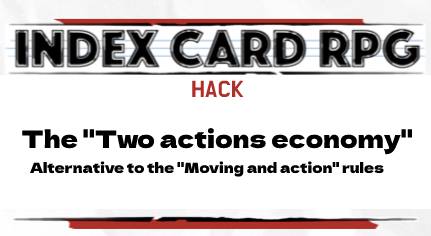
The two actions economy is simple:
Everyone gets two actions per turn.
Action types:
Move - Simple - Check - Attempt
Examples of turns:
- Move + Move
- Move + Action
- attempt + (HARD) attempt
If a the same action is choosen twice in the same turn, the action is HARD. This rule doesn’t apply on the move or simple action.
Edit: If a monster has 2 actions convert it to two “regular” actions, the second one is never HARD.
Edit : Delete the rule that make the second action EASY if it’s first attempt missed.


 my player for a move action. But then again, I’m starting to realize that maybe it makes more sense in your system. One action to jump on the rock without a check… and a second rock if he wants to instead of attacking. Yeah, it makes sense, I remove my criticism!
my player for a move action. But then again, I’m starting to realize that maybe it makes more sense in your system. One action to jump on the rock without a check… and a second rock if he wants to instead of attacking. Yeah, it makes sense, I remove my criticism! 